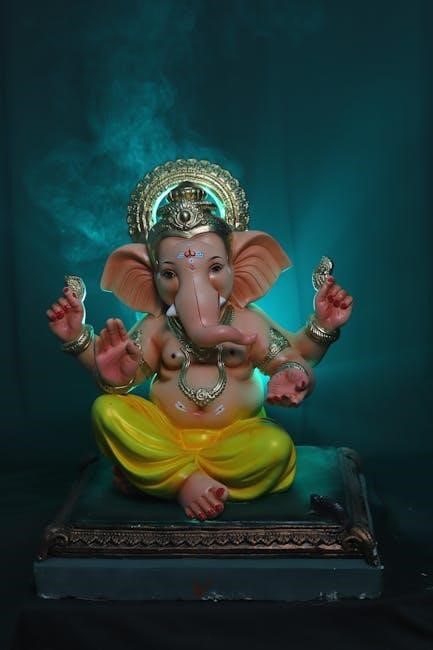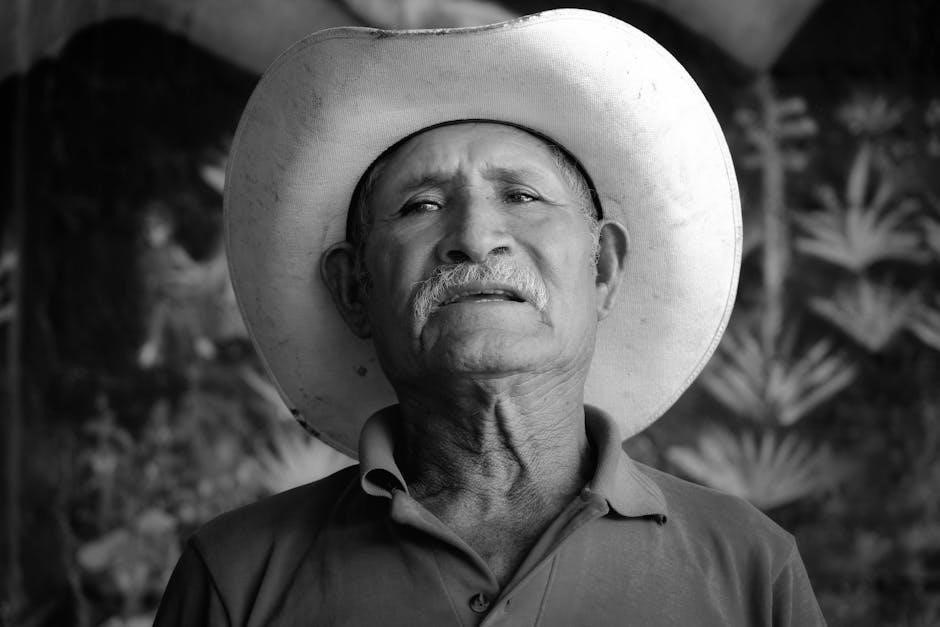Lord of the Flies by William Golding is a classic 1954 novel exploring human nature, society, and savagery. Available as a PDF, it remains a popular educational resource, widely downloaded for its timeless themes and insightful commentary.
1.1 Overview of “Lord of the Flies”
Lord of the Flies, written by William Golding, is a captivating 1954 novel that explores the descent into chaos of a group of British boys stranded on a remote island after a plane crash. The story delves into themes of human nature, savagery, and civilization, raising questions about morality and societal structures. The boys, initially hopeful and organized, gradually succumb to fear, power struggles, and primal instincts. The novel is a gripping allegory that reflects the darker aspects of human behavior. Its enduring popularity has made it a cornerstone of educational curricula, with its PDF version widely available for easy access to readers worldwide.
1.2 Significance of the PDF Format
The PDF format of Lord of the Flies has become a preferred choice for readers and educators due to its convenience and accessibility. PDFs preserve the original layout and formatting of the novel, ensuring a consistent reading experience across devices. This format is particularly beneficial for students, as it allows for easy highlighting, note-taking, and referencing. Additionally, PDFs are widely compatible with various platforms, making the novel accessible on smartphones, tablets, and computers. The availability of free PDF downloads has also democratized access to this literary classic, enabling global readers to engage with Golding’s profound exploration of human nature and societal dynamics without cost barriers.
Plot Summary
Lord of the Flies by William Golding follows British boys stranded on an island after a plane crash. They attempt to create a utopian society but descend into chaos, revealing the darker aspects of human nature through power struggles and savagery, ultimately highlighting the fragility of civilization.
2.1 Setting and Main Characters
The story unfolds on a remote, uninhabited island in the Pacific during an unspecified war. The main characters include Ralph, the fair-haired boy who seeks order, Jack, the power-hungry hunter, and Piggy, the intelligent but vulnerable voice of reason. Other notable characters are Simon, who discovers the island’s dark secret, and the Beast, a mysterious entity that embodies the boys’ fears. The island serves as a microcosm of society, where the boys’ descent into savagery mirrors human nature’s darker aspects. The setting isolates them, forcing raw emotions and primal instincts to surface, shaping their actions and interactions.
2.2 Key Events and Themes
The novel begins with a group of British boys stranded on an uninhabited island after a plane crash, sparking a journey of survival and self-discovery. Key events include the discovery of the conch shell, which symbolizes order, and the emergence of the “beast,” a mysterious entity that instills fear. Tensions rise as power struggles between Ralph and Jack intensify, leading to the tribe’s division. A pivotal moment occurs when Simon uncovers the truth about the beast but is tragically killed. Themes of civilization vs. savagery, fear, and the nature of humanity are central, as the boys’ behavior deteriorates, revealing primal instincts. These events highlight Golding’s exploration of human morality and societal breakdown.
Download Options
Lord of the Flies is available for free download as a PDF, Word Doc, or EPUB. Platforms like Scribd and Google Drive offer easy access to the novel in various formats, making it convenient for readers to enjoy this classic tale digitally.
3.1 Free vs. Paid Downloads
Users can access Lord of the Flies in PDF format through both free and paid options. Free downloads are available on platforms like Scribd, Google Drive, and the Internet Archive, offering convenience for readers. However, these versions may lack additional features or annotations found in paid editions. Paid downloads, available on Amazon or official bookstores, often include enhanced content, such as study guides or expert commentary, making them ideal for educational purposes. Both options ensure accessibility to William Golding’s timeless novel, catering to different reader preferences and needs.
3;2 Popular Platforms for Download
Several platforms offer Lord of the Flies in PDF format, catering to diverse user preferences. Scribd and Internet Archive provide free access, while Amazon and Google Books offer paid versions. Additionally, educational platforms like Course Hero and Harvard Students’ Resources host PDFs with study aids. These platforms ensure easy access to William Golding’s novel, making it convenient for readers worldwide to engage with this literary classic.

Themes and Symbolism
Lord of the Flies explores themes of civilization vs. savagery, power, and fear. Symbols like the conch shell and the beast represent order and primal instincts, respectively.
4.1 The Conch Shell and Power
The conch shell in Lord of the Flies symbolizes authority and democracy. Found by Ralph, it is used to call meetings and ensure speaking turns, maintaining order. Its power diminishes as the boys’ civility erodes, reflecting the decline of their moral structure. The shell’s significance is tied to the themes of leadership and the gradual descent into chaos. Its destruction mirrors the loss of innocence and the collapse of societal norms among the boys. The conch shell remains a potent symbol of the novel’s exploration of power dynamics and human nature;
4.2 The Beast as a Symbol
The Beast in Lord of the Flies represents primal fears and the unknown, serving as a unifying force among the boys. Initially, it is feared as a physical creature, but it evolves into a symbolic representation of the boys’ inner savagery. The Beast’s presence escalates tensions and justifies tribal behavior, reinforcing the novel’s theme of inherent human wickedness. The Beast’s “existence” is a manifestation of the boys’ collective paranoia and fear, highlighting their descent into chaos. Its symbolic significance underscores William Golding’s exploration of humanity’s darker aspects, making it a central element in the novel’s thematic structure. The Beast’s impact remains a critical point of analysis in the PDF versions of the novel.

Author Background
William Golding, a Nobel Prize-winning British author, was born in 1911. A former teacher and naval officer, his experiences shaped his writing, notably in Lord of the Flies.
5.1 William Golding’s Biography
William Golding was a renowned British novelist, born on September 19, 1911, in St. Columb Minor, Cornwall. He grew up in a family that valued education and literature, which heavily influenced his career. Golding initially pursued natural sciences but later shifted to English literature, developing a passion for writing. Before becoming a full-time author, he worked as a teacher and served in the Royal Navy during World War II. These experiences significantly shaped his worldview and writing style. Golding’s literary career flourished with the publication of Lord of the Flies in 1954, which became his most famous work. He went on to write several other novels, including The Inheritors and Pincher Martin, and was awarded the Nobel Prize in Literature in 1983. His works are known for exploring the human condition, morality, and the duality of nature. Golding passed away on June 19, 1994, leaving behind a legacy as one of the most influential writers of the 20th century.
5.2 His Other Literary Works
Beyond Lord of the Flies, William Golding authored several notable novels and essays. The Inheritors, published in 1955, explores the decline of a Neanderthal tribe, while Pincher Martin (1956) delves into psychological themes. Free Fall (1959) examines the moral journey of its protagonist, and The Spire (1964) offers a haunting tale of obsession. Golding also wrote Rites of Passage (1980), the first in the To the Ends of the Earth trilogy, which won the Booker Prize. His essays and lectures, including The Scorpion God, showcase his deep philosophical insights. Golding’s diverse works consistently explore themes of humanity, morality, and the complexities of existence, cementing his status as a literary giant.

Adaptations and Interpretations
Lord of the Flies has been adapted into films, stage plays, and a upcoming television series by BAFTA-winning writer Jack Thorne, exploring its timeless themes in new formats.
6.1 Film and Stage Adaptations
Lord of the Flies has been adapted into several films and stage productions, each interpreting William Golding’s timeless themes of human nature and societal collapse. The 1963 film adaptation, directed by Peter Brook, is notable for its faithful representation of the novel’s dark tones. A 1990 film version, directed by Harry Hook, offers a more commercial take, incorporating modern cinematic techniques. Additionally, stage adaptations have brought the story to theaters worldwide, emphasizing its universal relevance. Recently, a television series adaptation by BAFTA-winning writer Jack Thorne was announced, promising a fresh interpretation for modern audiences. These adaptations highlight the novel’s enduring appeal and its ability to resonate across different mediums and generations.
Study Guides and Resources
Study guides for Lord of the Flies provide in-depth analyses, chapter summaries, and discussion questions, helping students grasp themes like savagery and civilization. Available as PDFs, these resources enhance understanding and appreciation of the novel.
7.1 Educational Resources Available
Educational resources for Lord of the Flies are widely available, including PDF study guides, chapter summaries, and analysis of major themes like savagery and civilization. These resources are designed to enhance understanding and appreciation of the novel, making it easier for students to engage with the text. Many PDF guides include discussion questions, character analyses, and historical context, providing a comprehensive learning experience. Additionally, downloadable materials such as lesson plans and worksheets cater to educators, helping them teach the novel effectively. These resources are accessible online, offering convenience for both students and teachers. They play a crucial role in fostering deeper insights into Golding’s exploration of human nature and societal structures.

User Reviews and Ratings
Users praise the PDF of Lord of the Flies for its clarity and educational value, with many highlighting its relevance for both casual reading and academic study.
8.1 Reader Feedback and Ratings
Readers have praised the PDF of Lord of the Flies for its clarity and educational value. Many reviewers highlight its relevance for both academic study and casual reading. The novel’s timeless themes resonate strongly, with users often mentioning its thought-provoking nature. Positive feedback frequently includes compliments on the PDF’s formatting and ease of access. Ratings are consistently high, with many giving it a 4.5-star rating. Some readers appreciate the ability to download it for free, making it accessible to a wide audience. Overall, the PDF version of Lord of the Flies is well-regarded for its quality and convenience.
